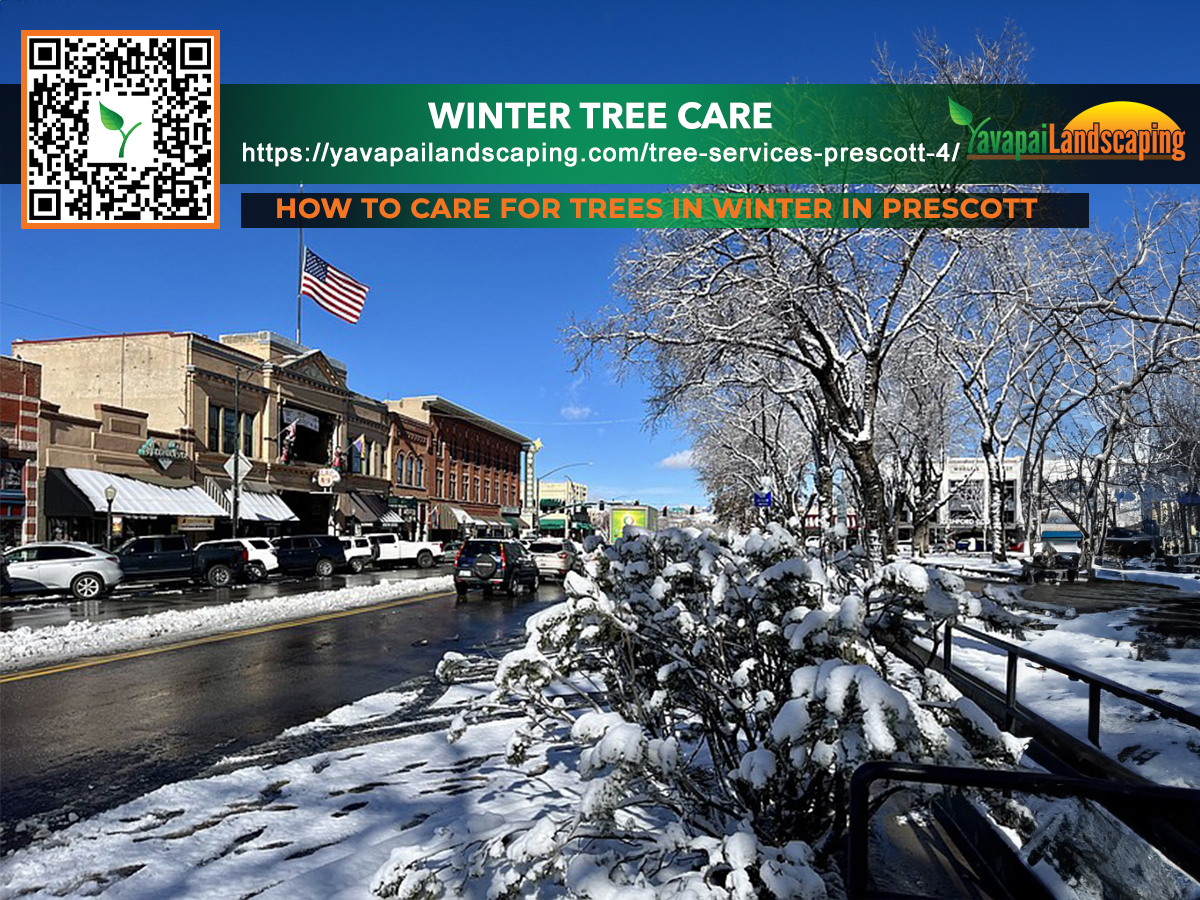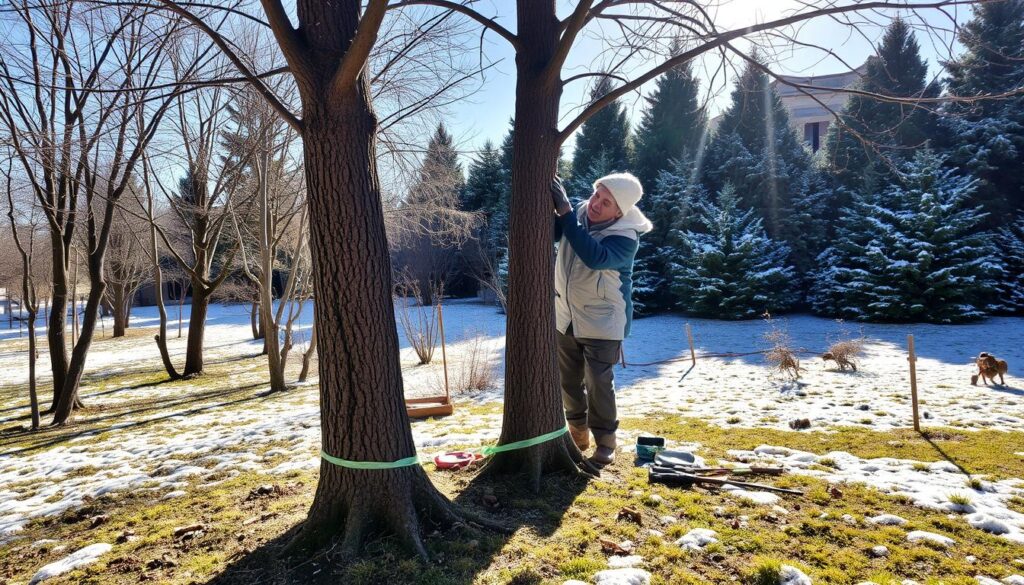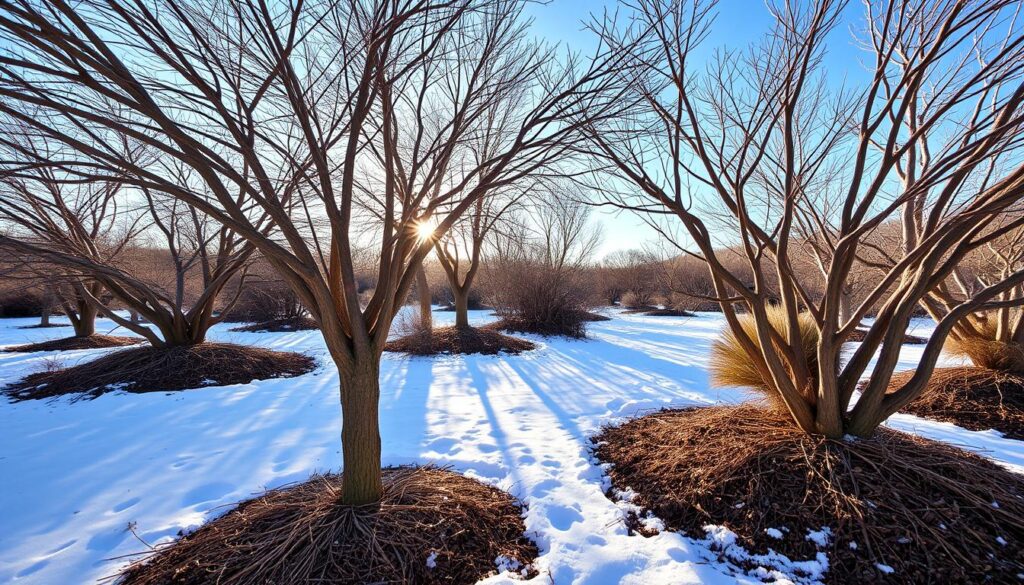
Winter tree care in Prescott, AZ, comes with its own set of challenges. Homeowners and landscapers must protect trees from cold weather. Many make mistakes that can harm their trees during the winter.
It’s important to care for trees right in Prescott’s winter. Mistakes like pruning at the wrong time or watering too much can damage trees. Knowing these common errors can help keep your trees healthy all year.
Key Takeaways
- Proper timing of pruning is essential for native tree species
- Pre-winter inspections help identify potential tree issues
- Overwatering during dormant periods can harm trees
- Snow and ice management impacts tree health
- Correct mulching practices protect tree roots in winter
- Adjusting watering schedules is crucial for winter tree care
- Professional tree services can provide expert winter maintenance

Winter Tree Care Mistakes in Northern Arizona
Caring for trees in Northern Arizona’s winter is tricky. Many people make mistakes that hurt native trees. Knowing how to care for them helps your landscape stay beautiful all year.
Improper Pruning Timing for Native Species
Pruning native trees at the wrong time can stress them. Many species go dormant in winter, making them weak. Cuts made then heal slowly, inviting disease. Prune most trees in late winter or early spring.
Neglecting Pre-Winter Inspections
Skipping winter inspections puts trees at risk. Look for weak branches that may break under snow. Also, check for disease or pests. Early detection helps treat problems before they get worse.
Over-Watering During Dormant Periods
Too much water in winter can harm dormant trees. It leads to root rot and fungal growth. Native trees need less water in cold months. Adjust your watering to match their needs. Check soil moisture to avoid waterlogged roots.
- Reduce watering frequency
- Check soil moisture before watering
- Allow soil to dry between waterings
Avoiding these winter tree care mistakes helps native trees survive Northern Arizona’s cold. Proper timing, regular checks, and careful watering ensure a strong spring comeback. Spend some time with this enlightening read.
Protecting Trees from Prescott’s Freezing Temperatures

Prescott’s winters can be very hard on trees. It’s important to protect them from the cold. Knowing which trees are cold hardy is the first step.
Wrapping trees in winter is a good way to protect them. Use burlap or tree wrap to cover the trunk and branches. This helps prevent frost damage and sun-scald.
Antifreeze sprays can also help. They create a barrier on leaves and branches against ice. Spray before the first freeze for the best protection.
- Choose cold-hardy tree species for new plantings
- Water trees deeply before the ground freezes
- Apply mulch around the base to insulate the roots
Good care in fall helps trees survive winter. Regular checks can spot problems early. With the right protection, your trees can do well even in Prescott’s cold.
Impact of Improper Snow and Ice Management on Trees
Winter can be tough on trees in Prescott, AZ. It’s important to manage snow and ice right to keep trees safe. Let’s look at ways to protect your trees from winter’s worst.
Snow Load Removal Techniques
Too much snow can snap branches and harm trees. Gently remove snow from branches with a broom or pole. Start from the bottom to avoid sudden snowfall.
For branches covered in ice, wait for them to thaw naturally. This helps avoid breaking them.
De-icing Salt Damage Prevention
De-icing salt can hurt trees by pulling moisture from roots and leaves. Use salt-free alternatives like sand or kitty litter to protect trees. If salt is needed, put barriers around trees with burlap or plastic.
Water trees well in spring to wash out salt. This helps them recover.
Branch Support During Heavy Snow
Use supports to keep branches from breaking before snow gets heavy. Use nylon straps or cloth to tie branches together. Avoid wire or rope that can harm bark.
Take out supports in spring to let branches grow normally. Regular pruning keeps branches strong, reducing the need for winter support.
By using these methods, you can help your trees make it through winter. With the right care, they’ll be healthy and green by spring.
Proper Winter Mulching Practices for Desert Trees
Winter mulching is key to protecting desert trees in cold months. It keeps the soil moist and controls temperature for better tree health.
Mulch Application Depth Guidelines
For mulching desert trees, aim for 2 to 4 inches deep. This depth insulates well without harming roots. Make sure not to pile mulch against tree trunks to avoid rot and pests.

Choosing Appropriate Mulch Materials
Organic materials are best for mulching desert trees in winter. You can use:
- Wood chips
- Pine needles
- Straw
- Shredded bark
These materials break down slowly, enriching the soil. Stay away from rocks or gravel, as they can get too hot and harm roots.
Common Mulching Errors
Watch out for these common mistakes when mulching desert trees:
- Applying mulch too thick
- Creating “mulch volcanoes” around tree trunks
- Using non-organic materials
- Forgetting to replenish mulch as it decomposes
By avoiding these errors, you can ensure your desert trees stay healthy all winter and beyond.
Winter Watering Schedule Adjustments
Winter irrigation in Prescott, AZ, needs careful planning. Drought-tolerant trees need less water in cold months but still need care. Adjusting your watering helps keep the soil moist without too much water.
During winter, trees go dormant. This means they need less water. For most drought-tolerant trees, water them once every 3-4 weeks. Always check soil moisture before watering to prevent too much water.
Here are some tips for winter irrigation:
- Water deeply but less often
- Avoid watering when temperatures are below freezing
- Use a moisture meter to check soil conditions
- Apply water at the tree’s drip line, not near the trunk
Remember, each tree species has its own needs. Native trees like pinyon pines and junipers need little water in winter. Non-native trees might need more water. Watch your trees and adjust your watering schedule as needed.
Proper winter irrigation keeps trees healthy and protects them from cold damage. It also prepares them for strong growth in spring. By changing your watering routine, your drought-tolerant trees will do well all year in Prescott’s climate.
Professional Tree Services During Winter Months
Winter in Prescott, AZ, brings unique challenges for tree care. Professional arborist services are key during this season. They help keep your trees healthy and long-lasting. Certified experts use special winter tree care techniques that homeowners might miss.
Getting a tree health assessment before winter is a smart move. It helps spot weak branches, diseases, or structural issues. Winter weather can make these problems worse. Early professional care protects your trees from frost, snow, and pests.
Yavapai Landscaping Prescott offers free estimates for Prescott and nearby locations for landscaping & tree services, which include tree elimination, tree pruning, stump grinding, land clearing, storm clean-up, and emergency tree care.
